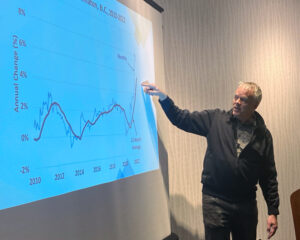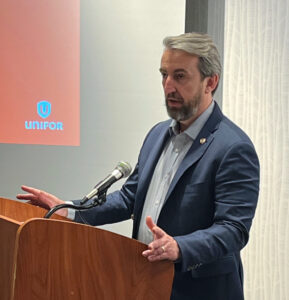Unifor 2000 held our first in-person union congress in three years on Saturday.
It was a great day of listening to first-class guest speakers, getting updates on our local’s activities, conducting union business and being able to speak to our fellow members face to face, or mask to mask.
In the business portion of the day, Stephanie Ip of Pacific Newspaper Group was acclaimed vice-president of the local. Stephanie has been on maternity leave and will succeed Pat Bulmer, who is retiring. Bill Catterall’s term as VP continues.
Jessica Murdy (from Abbotsford) was elected to the elections committee, joining Joe Fries and Cayley Dobie.
A motion to hold in-person congresses every three years with the other two years to be conducted virtually was approved.
President Brian Gibson and Secretary-Treasurer Jennifer Moreau gave reports. (More on those later). Brian conducted an informative workshop on mental health, and members split into groups to discuss the good, the bad and ideas for the future of the local.
Guest speakers were labour economist Jim Stanford, a former director of policy for the CAW and Unifor, Unifor Western Regional Director Gavin McGarrigle and our lawyer, Tony Glavin, who talked about vaccination policies.
Here’s a review of what we heard:
Jim Stanford
In its bid to bring down inflation, the Bank of Canada will drive Canada into a recession by continuing to raise interest rates — and it will demand workers take most of the pain, along with the blame, Stanford said.
Workers are “going to be scapegoated for inflation and forced to bear the burden of the adjustment,” Stanford said.
He noted this current round of inflation is temporary, caused largely by issues related to the reopening of the economy after the pandemic. In fact, Canada’s inflation rate is lower than many countries and will fall next year.
 Despite central banks like the Bank of Canada knowing inflation is temporary, “they are jumping into the fray to increase interest rates and slow down inflation as a result.”
Despite central banks like the Bank of Canada knowing inflation is temporary, “they are jumping into the fray to increase interest rates and slow down inflation as a result.”
“Profits have exploded during this inflation, yet we’re just told there’s nothing we can do about it, that it’s just supply and demand, and instead they come after us to cut our wages.”
“High interest rates are really going to have a devastating impact on all kinds of things. They aren’t going to eliminate inflation or even reduce inflation in the short run.”
Worker demands to have their wages keep up with inflation don’t cause or enhance inflation, Stanford said.
“When the central bank stands up and says we’ve got an inflation problem — what are we going to do? — they point the finger at the people who are the victims of it, even though they will admit wages did not cause this inflation, they will still say you have to tighten your belt and take a real wage cut.”
Stanford said COLA (cost of living adjustments) clauses are good way for workers to keep up with inflation. BC public workers recently agreed to a version of COLA, which is a good model to follow, he said.
Stanford also noted the Bank of Canada’s mandate is to create maximum sustainable employment, but it’s not doing that part of its job.
“Having a five or six or seven per cent inflation for a couple of years is not the end of the world. It is not worth throwing the whole world economy into the soup for. This is a deliberate recession,” he said.
In other comments, he told us cryptocurrency is a scam.
Gavin McGarrigle
Gavin recapped some of Unifor’s activities during the pandemic, focusing on B.C., where the union has been a busy two years in transit, forestry, mining and other sectors Unifor has a large presence in.
“In the last year, we have seen more strikes in Unifor than in our entire history since our founding. We have seen more contracts rejected by our members because even though they’re great contracts, they’re not good enough in the age of inflation.
Unifor was also busy organizing — WestJet and News1130 are among the new member shops.
McGarrigle has been on a number of provincial task forces as well, trying to keep labour’s voice strong while being outnumbered.
McGarrigle said he lobbied federal NDP leader Jagmeet Singh to reach a Confidence and Supply Agreement with the federal Liberals. That happened and the result will include a dental care program, anti-scab legislation, paid sick days and child-care enhancements.

The Liberals announced a consultation process before they bring in anti-scab legislation. McGarrigle recently met with Finance Minister Chrystia Freeland: “I reminded her there was no way we’re going to settle for anything less than full anti-scab protection for all of our members in both strikes and lockouts.”
Provincially, Unifor successfully lobbied the government for extra statutory holidays, paid sick days, card-check certification, paid vaccination leave, and for skilled trades to be certified.
“B.C. was one of the only jurisdictions, with our pushing, that basically said if you’re working and you get COVID, presumptively it’s going to be deemed a workplace injury,” he said.
More WorkSafeBC changes that will benefit workers are likely coming, McGarrigle suggested.
Unifor is also lobbying the province to exempt newspapers from the Extended Producer Responsibility Program. That program levies fees on manufacturers and retailers for their packaging. But the newspaper industry argues newspapers aren’t packaging – they are the product.
McGarrigle said he got some pushback from the province, but, still, a deal may be possible next year.
He congratulated Purdy’s members on their new contract.
“We almost had a strike at Purdy’s, but you guys took it to them and got a great deal. To see Purdy’s workers stand up and fight and take it right to the end … a lot of our members across Canada were really proud to see (it).”
Unifor’s BC council meets in November in Whistler. Watch for a return of the Unifor Holiday Social in December.
Tony Glavin
Employer rights to implement mandatory vaccination policies have been reaffirmed over and over, including in decisions that came down this summer, lawyer Tony Glavin of Koskie, Glavin, Gordon said.
“The law is actually heavily sided in favour of employers rights to impose mandatory vaccination policies.
“Normally, there’s a whole series of policies that management gets to impose unilaterally in order to run their operation if they’re not restricted by either the law or the collective agreement.”
Employers have a duty to make a workplace safe while employees have a right to know what hazards are present, Glavin said.
Many people may not know that if you must get a vaccination because of workplace rules and have an adverse reaction, you may be able to make a WorkSafeBC claim, Glavin said.
“There has not been one single successful case in overturning a mandatory vaccination policy,” he said. “Right across Canada. So your chances of success of pursuing a grievance successfully are low, super low. They’re like zero per cent.”
However, firing employees for not getting vaccinated has been determined to be a step too far.
“The only aspect of a case that has been successful for the union in all the vax cases across Canada is where the employer sought to terminate the employee … The arbitrator said you can keep him out of work with no pay, but you cannot terminate.”
Some people think they can use the Charter of Rights to refuse vaccinations, but Glavin said that’s not so.
First of all, the charter doesn’t apply to private employers, just to governments and public institutions.
“The courts and arbitrators and all sorts of adjudicators have said your charter rights under section 7 would be triggered and violated if the government was holding you down and sticking a thing in your arm. That’s a violation of your right to security of the person under section 7 of the charter.
“Section 7 right doesn’t extend to your right to go to work without having a mandatory vaccination policy …. No one’s forcing you, not holding you down and jabbing it in your arm. You have a right to say no … but there are consequences.”
Servicing report – Brian Gibson (excerpts from written report)
Bell Media
“The Unifor National Executive approved the merger of the former Local 827M with Local 2000 on February 1, 2022 …There are staffing challenges with a lot of turnover and it is difficult to attract new hires.”
Prince George Citizen
“Members at the Citizen have returned to a 5-day work week, ending the pandemic LOA for the 4-day work week. One member decided to remain on the 4-day work week and we signed an LOA to allow for this.
“One of the concerning issues is with a change brought in by the Provincial Government that removes the obligation of cities in BC to advertise bylaw changes and public announcements in local newspapers. Prince George city council has decided it would post public announcements, hearings and bylaw changes on its website and not the newspaper starting Nov. 1. I have sent a letter to the current city council asking them to reconsider.”
SpeeDee Printers
“Members ratified a new three-year collective agreement over the summer. Highlights include a 3% wage increase in the first year with 20 weeks of retroactive pay, then a 40 cents per our increase effective on Jan. 1, 2023 and a further increase of 45 cents per hour on Jan. 1, 2024.
Kamloops This Week
The company “asked for an extension to the current contract, which expired on April 30, 2022, until Aug. 31, 2023 with a 2% base wage increase. We presented the agreement to the members on Oct. 11 and 12 in which they voted the agreement down. We need to schedule new discussions.”
Kelowna-Penticton
“We are still trying to negotiate a new collective agreement. Talks stalled earlier this year and we are in medication with mediator Dave Schaub. The progress has been painfully slow. The challenge is getting the employer focused and engaged.”
Mitchell Press
“The EI workshare program has now ended. Everyone is now working full hours. We have resolved all outstanding grievances except for one concerning Truth and Reconciliation, but we are working on resolving this during bargaining.”
Pacific Newspaper Group
“The company approached us to inform us they were letting members in consultation with their manager decide if they wanted to return to the office full time starting this fall, work from home full time or some sort of hybrid between the two. Most members continue to work from home with the advertising members coming into the office a couple days per week with the balance working from home.”
Monday issues of the Sun and Province have been cancelled and deadlines moved up to 5 p.m. That means no late sports scores or election results.
Jennifer Moreau servicing report (excerpts)
Black Press Lower Mainland
“We concluded bargaining for the Lower Mainland contract with a three-year deal with a $1,250 signing bonus, 2.5% retro to Jan. 1, 2022 and 2.5% in 2023.”
Black Press Trail Times
“The employer has filed a bad faith bargaining complain against the union. We’ve filed for mediation and the employer is refusing to participate.”
Glacier Lower Mainland
“For the Burnaby Now and the Record, we have a tentative three-year agreement of $500 signing bonus with 2% in 2022, 2.5% in 2023 and 2.5% in 2024 with no concessions.” (Update: Members approved the deal in a ratification vote.)
“For the Tri City News, we are hoping to start bargaining in January.”
Purdy’s
“We narrowly averted a strike and concluded bargaining with a four-year agreement that saw $1.25/hour increases to all specialized classifications, and increases to the general help grid in the first year that range from 3.5% to 18.25%, plus increases for all employees of 2.5%, 2.5%, 2.5%.
“We have a very strong group of four stewards: Yung Phou, Jennifer Loreto, Devon Paterson and Constance Nie.”
Victoria Times Colonist.
“Sadly we are losing this unit after the employer served Section 54 notice that they were contracting out the work or offering our members employment in a classification under the Guild jurisdiction. Of the five employees, four chose to move to the Guild. For the fifth employee, national rep Andrea MacBride negotiated an excellent severance package.”
Jennifer Moreau – Secretary-Treasurer report
“I’m pleased to report a bright spot on our fiscal forecast thanks to wage cuts and slightly higher than predicted income.”
(Officers are working a nine-day fortnight, following the practice at Pacific Newspaper Group. Staff member Cathy Cartwright has taken a partial buyout and is working a reduced work week.)
“We are in much better financial shape looking back at 2021 and 2022 to date.
“Membership stabilizing: As of July 2022, our membership total is 574, up from 483 in May 2021, and 496 in July 2020, but still down from 652 in pre-pandemic 2019.”
“Thank you to the executive members who continue to represent our members and provide leadership and valuable input. Thank you to all of our union activists, who have stepped up to exercise our collective power as a union.”
Jennifer is also chair of the Unifor Media Council and is on the executive as North American rep with the International Federation of Journalists.


Recent Comments